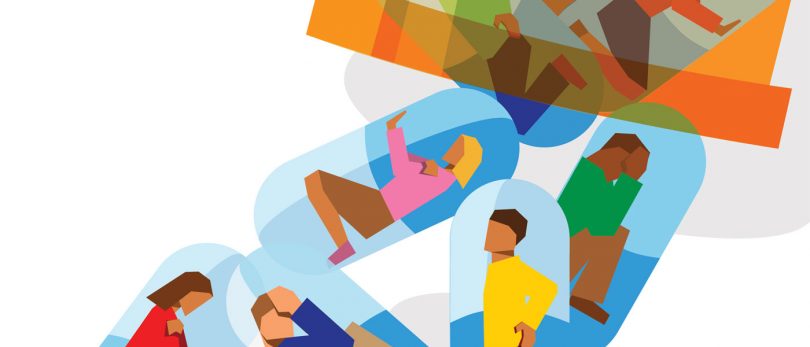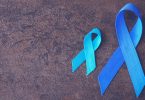“Julie,” a woman in her 20s whose name has been changed in this article for privacy, fell into opioid addiction gradually, the way many people do. At age 18, right out of high school, she was first introduced to prescription drugs by an ex-boyfriend and wasn’t aware of their addictive nature or the harm they can do.
“At 20, my life started falling apart,” Julie says.
“I was stealing money from my mom, going to work just so I could have enough money to buy some more, and that was what my life revolved around.”
Around that time, Julie first got evaluated for the UHS medication-assisted treatment (MAT) program, which is part of the New Horizons Outpatient Services clinic. However, Julie wasn’t ready and didn’t return to UHS for treatment until about a year later, when she found out she was pregnant.
Taking the First Step
In September 2018, the UHS Addiction Medicine Program launched an innovative new initiative aimed at increasing engagement and making treatment easier to access for patients. Called “Open Access,” this program allows people with substance use disorders to receive an assessment with no appointment needed.
“You can come in and do an evaluation, and if you need treatment, you generally start the next day. We know it takes courage for people to take that first step, so we want to address people’s needs in the moment,” says Debby O’Brien, New Horizons Outpatient Program manager.
Open Access is available at 10 Mitchell Ave. in Binghamton, every Monday through Friday, from 9 to 11 a.m. and 1 to 3 p.m., except for Wednesday afternoons. To register in advance, call 762-2901. To learn more, visit nyuhs.org.
Expanded service
Julie’s pregnancy spurred her to visit the UHS clinic and begin MAT. In addition to MAT, UHS also provides pregnancy services through the clinic to make access to care easier for patients. This is just one way that UHS encourages community members to get treatment and engages with patients as they go through treatment.
“We have a lot of innovative programs in our addiction medicine program,” says Julia Hunter, MD, MPH, FASAM, addiction medicine specialist at UHS. “One is the pregnancy program and, in addition to treatment, we provide education about pain control, breastfeeding and other topics, as well as support groups. Particularly important is our postpartum support group, because that is a very vulnerable time for women. When they’re no longer pregnant, the risk of relapse is high.”
Julie experienced this firsthand after giving birth.
“I still used every once in a while,” she says. “I felt better and I felt good and had no need to use, but my brain felt like I still wanted to. It was like a reward for doing better. I would have dreams where I woke up, and it felt like I was still using.”
She explains that failing drug tests at the clinic and knowing that she was disappointing her counselor, her mom and her family was “the worst feeling.” At that point, something clicked for her, and she started to get more help.
Support when you need it
The addiction medicine team at UHS focuses on engagement. When patients aren’t engaged with their treatment and the people providing that treatment—such as counselors, nurses, doctors, administrative staff and others—they are more likely to stop or postpone treatment.
“That’s one of the things that’s different with our treatment program compared to others,” says Calvin Brown, MAT program manager at UHS. “Treatment for chemical dependency is mostly short-term—inpatient is 14 days and outpatient is four to six months. We have patients for 20 years, so the relationships you develop are strong bonds over many years and patients come to us with all sorts of problems. It’s a big part of why we can be effective in doing other services in addition to treating addiction.”
UHS uses a “hub and spoke” model for its addiction treatment, where the clinic is the hub and the spokes are different services and specialties throughout the UHS System.
“We have a team here of very experienced counselors, physicians and nurses that can monitor and manage medication and then send patients to other services, such as primary care providers or specialists,” says Dr. Hunter. “That allows us to maximize the impact of our expertise.”
For Julie, connecting to Alcoholics and Narcotics Anonymous meetings, as well as group therapy in the UHS MAT clinic, provided her the support she needed to break through feelings of isolation due to her addiction.
“I felt like I wasn’t alone,” she says. “I heard stories from people who were sober for four or five years. At the beginning, I didn’t think that was possible. It made me understand I was an addict, and now I’m sober, but it also made me realize there was more to me that I didn’t understand.”
Spokes of Support
The UHS Addiction Medicine Program uses a “hub and spoke” model for its approach to treatment. Addiction medicine services are the “hub,” or starting point, and the “spokes” are other UHS services that addiction medicine patients may need. While addiction medicine staff can refer patients throughout the UHS system, here are some of the more innovative services offered:
- Comprehensive Pregnancy Program – This includes a weekly group for pregnant patients with opioid use disorder and a weekly postpartum club, among other services.
- Women’s Health Clinic – The UHS Addiction Medicine department works directly with the OB/GYN department to provide convenient access to care. This includes monthly on-site visits by an OB/GYN provider.
- Hepatitis C Clinic – UHS is one of the only providers in the area to offer hepatitis C screening and treatment on-site at their clinic.
Finding hope
Truly understanding her condition was important to Julie, because she has always had an interest in science and, in particular, understanding how the brain works. Her counselors and doctors at UHS helped her understand the biological underpinnings of addiction, setting the stage for her next life goal.
This May, Julie will receive her undergraduate degree in biology and she plans to go on and pursue a master’s degree, either in healthcare administration or nursing.
“[When I was using,] I believed I was a bad person, and I felt like I wasn’t deserving of love,” says Julie. “But where I am now is a complete 180 from that point. I can actually sleep at night, my son is healthy and I feel good about myself. I have a list of goals that I’ve accomplished and more that I want to accomplish. The help I’ve received at the clinic has been a positive force for me.”
After battling her way out of addiction, Julie’s future for herself and her family is bright. And her story is just one of many.
“A lot of the conversation around opioid use disorder paints this disease as a hopeless condition,” says Alan Wilmarth, administrative director of Behavioral Health at UHS. “But I think it’s essential that we begin to talk about the fact that there is hope. That hope is real and people do recover from this disease.”
A HUB FOR CARE
The UHS Addiction Medicine Program offers a wide range of services to make sure everyone gets the support they need. To learn more, visit nyuhs.org.







